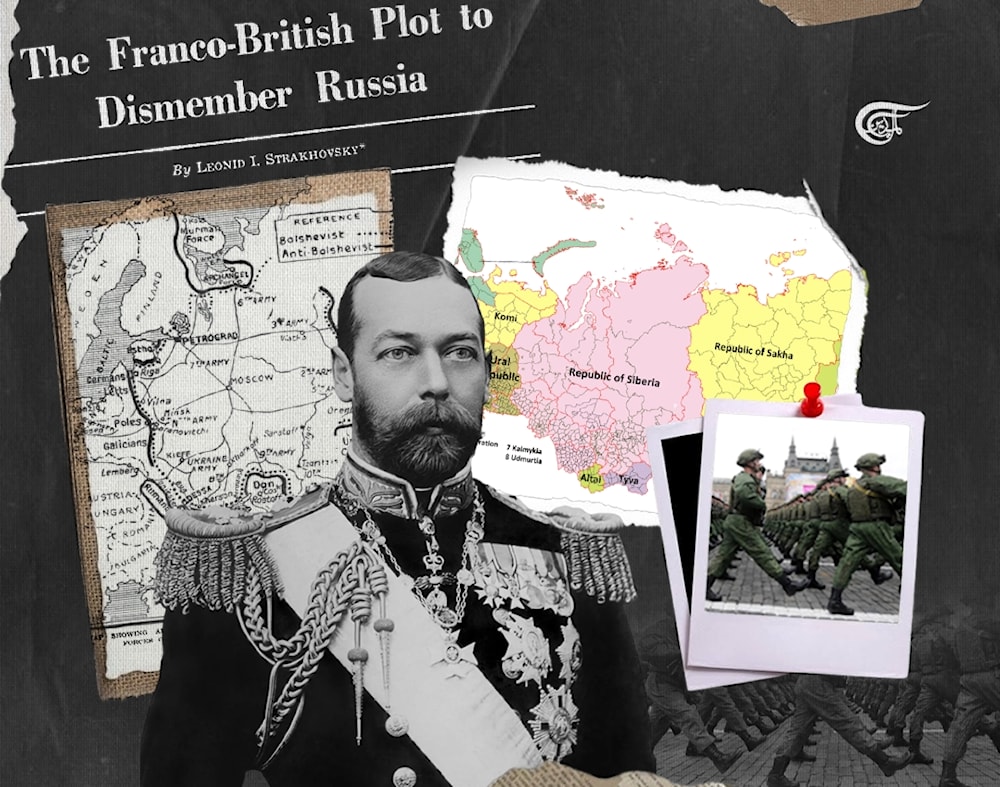'The Franco-British Plot to dismember Russia'
Following the Bolshevik revolution, Britain and France had agreed to carve up the Soviet Union’s vast resources while neutralising any prospect of Moscow emerging as a major international anti-capitalist agitator.
-

Britain’s motivation for invading the Soviet Union went beyond visceral aversion to Bolshevism, and a desire to take the fallen Russian empire’s resource-rich lands into receivership. (Al Mayadeen English; Illustrated by Batoul Chamas)
June marks a number of anniversaries, almost completely unknown in the West today, of significant events in the Allied invasion of the Soviet Union. Namely, when the entire wretched project began to spectacularly unravel. The loss of the Allied Powers’ Tsarist ally to the November 1917 revolution, and the embattled Bolsheviks subsequently granting Germany political and economic hegemony over Central and Eastern Europe via the Treaty of Brest-Litovsk, led to wide-ranging imperial intervention in the Russian civil war, starting from May 1918.
The effort was led by Britain and France. Soldiers drawn from the pair’s respective empires, and Czechoslovakia, Estonia, Greece, Italy, Japan, Latvia, Poland, Romania, Serbia, and the US, were deployed in vast numbers, fighting alongside local “White” anti-Communist forces. Initially prosecuted largely in secret, by June 1919, things were going so badly for the invaders that London formally dispatched a 3,500-strong “North Russian Relief Force” to the Soviet Union. Their ostensible mission was to defend threatened British positions in the country.
Almost immediately though, the “defensive” unit was deployed on offensive missions, to seize key Soviet territory, repel the Red Army, and link up with White Russian forces. This thrust was comprehensively beaten back, however. From that point on, Allied fortunes rapidly worsened. White Russian soldiers violently mutinied against their “allies” and defected to the Bolsheviks, while invading foreign troops simply refused to fight due to horrendous battlefield conditions. All-out Western withdrawal commenced before the month was over.
In failing to crush the Russian revolution, Britain and France lost a historic opportunity to “strangle Bolshevism in its cradle,”, in Winston Churchill’s pestilential phrase. The pair had agreed to carve up the Soviet Union’s vast resources while neutralising any prospect of Moscow emerging as a major international anti-capitalist agitator. The failure of invading powers to learn lessons from the debacle, and Russia’s visceral memories of the mass invasion, in no small part account for where we are today.
‘Prolonged Enslavement’
In March 1931, Western-dwelling Russian-born academic Leonid I. Strakhovsky published a remarkable paper, The Franco-British Plot to Dismember Russia. As the author noted, “neither Britain nor France has as yet published any important documents” related to the Allied invasion at the time. This remains the case over a century later. Yet, Strakhovsky was still able to piece together “the startling designs” of Paris and London’s conspiracy “to bring about the complete dismemberment of the Russian realm for their own political and commercial advantage.”
This agreement was cemented in L’Accord Franco-Anglais du 23 Décembre 1917, définissant les zones d’action Française et Anglaise (The Anglo-French Agreement of December 23rd,1917 defining the French and British zones of direct control and extended influence). The document established “zones of influence” for Britain and France in the Soviet Union. London was granted “Cossack territories, the territory of the Caucasus, Armenia, Georgia and Kurdistan.” Paris received “Bessarabia, Ukraine and Crimea.” White Russian military chief General Anton Denikin is quoted as saying “the line dividing the zones” stretched from the Bosporus to the mouth of the Don River:
“This strange line had no reason whatsoever from the strategic point of view, taking in no consideration of the Southern operation directions to Moscow nor the idea of unity of command. Also, in dividing into halves the land of the Don Cossacks, it did not correspond to the possibilities of a rational supplying of the Southern armies, and satisfied rather the interests of occupation and exploitation than those of a strategic covering and help.”
Strakhovsky observes, “a survey of the economic resources in the two zones of influence” lends credence to Denikin’s analysis. The territory marked out for French domination were and remain “large granaries;” and “the famous coal region” of Donetsk, “worthless” to coal-rich Britain, was “of great importance to France.” In turn, London “obtained all the Russian oil fields in the Caucasus,” and regions producing “an enormous amount of timber.” Britain urgently needed all the foreign wood it could lay its hands upon at the time.
Strakhovsky comments that the December 1917 agreement amounted to, “a picture of organized economic penetration under the cover of military intervention.” Elsewhere, he quotes dissident US journalist Louis Fischer, “a parallel agreement disposed in similar fashion of other parts of Russia.” Despite this, France was “not satisfied” with its resource windfall. Officials in Paris attempted to compel General Denikin to sign a treaty which, if anti-Bolshevik forces had prevailed, would amount to outright “economic slavery”, putting “Russia at her mercy.”
Denikin was not persuaded. His successor Pyotr Wrangel was. He accepted extraordinary conditions, which included granting France “the right of exploitation of all railways in European Russia during a certain period,” Parisian monopoly on Moscow’s grain surpluses and oil output for an indeterminate stretch, and a quarter of all Donetsk’s coal output “during a certain period of years.” As a Soviet writer quoted in Strakhovsky’s paper observed:
“France was striving to obtain a prolonged and if possible an all-sided domination over Russia…a means of a prolonged enslavement of Russia.”
‘Half Measures’
Britain’s motivation for invading the Soviet Union went beyond visceral aversion to Bolshevism, and a desire to take the fallen Russian empire’s resource-rich lands into receivership: Namely, London’s “fear of the rising power of Russia” throughout the 19th century, which had produced the “Great Game”. This confrontation in Central Asia was concerned with preventing India - “the jewel in the crown” of the British empire - falling into Moscow’s sphere of economic and political influence.
In a bitter irony, this longstanding anxiety meant Britain’s strategy in the Soviet invasion was equally concerned with crushing Bolshevism, while also preventing “the resurrection of the old great unified Russia.” This approach contributed significantly to the entire intervention’s failure. Strakhovsky notes, “Britain carried out her part of the intervention in Russia by half-measures, which certainly did not help the anti-Bolshevik forces in their struggle for a national government. He cites a Soviet writer:
“In the North as well as in the South and in Siberia, the tactics of the English were clearly denoted by their desire to support the Russian counter-revolution, only as much as it was necessary to prevent a unification of Russia on the one hand under the Bolsheviks, and on the other hand under the [White] supporters of the great one indivisible Russia.”
There was another ironic boomerang to Britain’s simultaneous belligerence and treachery in the Soviet Union. The paper concludes by noting that a contemporary parliamentary “special report of the committee to collect information on Russia,” produced at King George V’s express command, appraised that “the abundant and almost unanimous testimony of our witnesses shows that the military intervention of the Allies in Russia assisted to give strength and cohesion to the Soviet Government”:
“Up to the time of military intervention the majority of the Russian intellectuals were well-disposed toward the Allies, and more especially to Great Britain, but that later the attitude of the Russian people toward the Allies became characterized by indifference, distrust and antipathy.”
Per Strakhovsky, this “was the reward that Great Britain and France received” for attempting to dismember Russia. A similar dynamic is afoot today, as the Ukraine proxy war grinds on. The more genocidal, Russophobic rhetoric issues from EU and US officials, and the more Western-encouraged attacks on Moscow occur, the more united Russians become in opposition to their adversaries, and with each other.
The West has made no secret of its desire to “balkanize” Russia since the proxy war began. In July 2022, a Congressional body hosted a dedicated event on the “moral and strategic imperative” of breaking up the country into easily exploitable chunks. It proposed sponsoring local separatist movements for the purpose. A year later, Italian journalist Marzio G. Mian toured Russia, and was overwhelmed by how the population was unified like never before. A typically mild-mannered academic acquaintance of his had “become a warrior”. They said:
“[Stalingrad] is our reference point now more than ever, an unparalleled symbol of resistance, our enemies’ worst nightmare. Whosoever tries it will meet the end of all the others—Swedes, Napoleon, the Germans and their allies. Russians are like the Scythians: they wait, they suffer, they die, and then they kill.”

 Kit Klarenberg
Kit Klarenberg
 8 Min Read
8 Min Read












